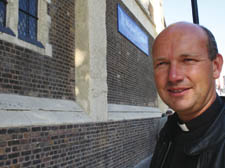|
|
 |
| |

Reverend Malcolm Hunter outside his old church St Michael’s in Camden Town |
Father Malcolm is ready to scale new heights with role in prison
HE was never your ordinary priest.
From the moment he roared into Camden Town on his Harley Davidson back in 2003 to the time he spent 10 days living on his church roof to raise money (pictured below), the Reverend Malcolm Hunter has redefined what it means to wear a dog collar in modern times.
After a colourful five years in Camden – first at St Mary’s Church in Somers Town, then at St Michael’s in Camden Town before his final stint at St Pancras Old Church in King’s Cross – Father Malcolm is ready to take on his most challenging post yet.
His final service at St Pancras Old Church is on Sunday at 11am and then it will be off to a new job as the Church of England chaplain at HMP Bronzefield, the all-women’s prison in Middlesex.
“It’s something I felt I had to do – it’s not something I particularly want to do,” admitted the former construction manager, who dumped a six-figure salary to become a priest.
“I’m quite scared and worried about it,” he added, his apprehension based on experience.
Well-acquainted with prison life, Father Malcolm spent months over the years visiting Pentonville and Holloway prison. He says he hates
locking people up, but
hearing the key turn behind him is something he will have to get used to when he takes his place behind prison doors.
“I find the reason most people are in prison to be most unfair,” he said, describing locking people up as “grotesque”.
A man well-known for his work with drug addicts in Camden Town, he is also aware that crime and drugs usually go hand in hand in a tragic cycle that leads many to re-offend. “But you can’t give up on drug addicts. You have to go on a long journey with them,” he said.
Just under half the prison population can’t read or write, while in a women’s prison four fifths will self harm
and just under half
will try and commit suicide. Nearly everyone in prison has some form of mental health issue, he added, warning: “One has to question whether prison is the right place for them.”
He does also admit that he was initially unsure about taking up a post in a women’s prison and asked if they normally employed a woman. But he was told “they would like a man” to improve the inmates’ relationships with men.
“Many of the females are in an abusive relationship and they’re looking for a role model that will be different to the abusive model,” he said, “and a man that can begin to understand them.” |
 |
|
|
 |
| |
| |
|
 |
|